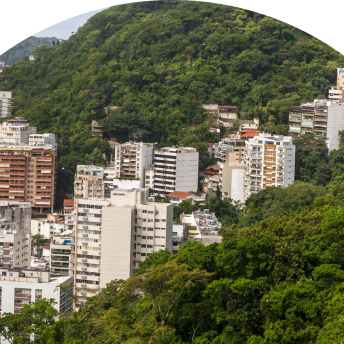COP
49.06 million
$683.94 billion
67th ranked
Spanish
Monthly
Benefits of hiring in Colombia
Benefits of hiring in Colombia
Colombia has one of the most attractive economies in Latin America for foreign investment. The country is a signatory to 17 commercial agreements, and it’s friendly to global trade with access to a market of 1.5 billion consumers. Additionally, Colombia has ports on both the Pacific and Atlantic Oceans, ensuring it is a strategic business location.
Colombia is a founding member of the powerful Latin American trading bloc, Alianza del Pacifíco (the Pacific Alliance), which includes Chile, Peru, and Mexico. The bloc represents 50% of Latin America’s foreign trade and 45% of total foreign direct investment in the region.
Due to political stability and consistent economic growth, more than 700 multinational companies introduced Colombian investment programs.
Colombians are known for being innovative and having an entrepreneurial spirit. According to the World Bank, the country has a literacy rate of 96%. It’s easy to hire motivated and skilled workers in Colombia. With the help of an employer of record in Colombia, it can be even easier to hire and onboard new workers at your company.
The Colombian government introduced the Ministry of Science, Technology, and Innovation in 2009 to invest heavily in educating and training its population to be competitive in the job market.
Colombia has one of the most attractive economies in Latin America for foreign investment.
Challenges of hiring in Colombia
Colombia remains the top producer and exporter of cocaine in the world. While violence associated with the drug trade has declined, the issue’s prevalence persists, and it affects the country’s economy.
Due to its insufficient copyright legislation and lack of enforcement, Colombia is placed on the United States Trade Representative’s 2022 watch list.
According to Transparency International, Colombia ranks high in corruption and lack of transparency. Bribery is a common business practice in particular sectors.
Colombia ranks high in corruption and lack of transparency. Bribery is a common business practice in particular sectors.
Cultural nuances and must-knows of doing business in Colombia
Colombians are punctual when it comes to business endeavors. Arriving on time is important to make a good first impression, as punctuality expresses respect.
When doing business in Colombia, it’s considered polite etiquette to address colleagues with gendered and professional titles until they initiate a change to a first-name basis.
Establishing a personal connection with colleagues is important and expected, as personal relationships are a large part of Colombian business culture.
Patience is required while doing business in Colombia, where building trust in relationships takes time. Trust is a strong indicator of the strength of a Colombian business relationship.
Avoid stereotypical topics such as violence and drug cartels. Colombians can find it tiring or even annoying when asked to explain a historical and complex conflict that is difficult to summarize for those with little background knowledge. Most are repulsed by Colombia’s struggles and seek to redeem the country’s reputation.
Make an effort to highlight positive attributes of the country, such as its literature, art, and welcoming energy.
Establishing a personal connection with colleagues is important and expected, as personal relationships are a large part of Colombian business culture
Hiring in Colombia
-
Employment agreements in Colombia
In Colombia, an employment agreement or contract is not mandatory by law. However, the following terms are required to be written, if applicable:
- Probation period
- Fixed-term contract
- Integral salary (benefits included in the salary)
- Non-salary payments
If fixed-term employment agreements are not agreed in writing, it is implied that the agreement is for an indefinite term.
-
Probation periods in Colombia
The maximum probationary period in Colombia is two months for indefinite-term contracts and one-fifth of the contract’s duration for fixed-term contracts.

Easily navigate payroll laws, contributions, and requirements in Colombia.
-
Minimum wage and salaries in Colombia
- President Iván Duque Márquez announced and ratified Colombia’s minimum wage for 2022 in December 2021. The wage was set to COL$1,000,000 monthly (USD$231.72), with a transportation allowance of COL$117,000 (USD$27.11). The minimum wage in Colombia is set every year by the national government and enforced by the Ministry of Labor.
-
Probation period in Colombia
- The maximum probationary period in Colombia is two months for indefinite term contracts and one-fifth of the contract’s duration for fixed-term contracts.
-
Bonus payment in Colombia
- A 13th month salary is prescribed by Colombian labor law. The 13th salary is equivalent to one month’s salary, paid in two installments: one half of the payment in June and the other half in December.
-
Overtime in Colombia
With authorization from Colombia’s Ministry of Labor, employees may work up to 12 hours of overtime per week, given they are allowed to rest on Saturday. Overtime worked during daytime hours is compensated at 25% more than the employee’s usual wage per hour. Overtime worked during nighttime hours is compensated at 75% more than the employee’s usual wage per hour.
Tax and Social Security in Colombia
Individuals are considered Colombian tax residents if they stay in the country for more than 183 days within any given 365 consecutive-day terms.
Colombian tax residents face taxes on their worldwide income. Non-tax residents are taxed only on Colombia-source income.
Tax thresholds in Colombia
- Colombia has an income tax structure where an employee’s income is taxed in units. There are thresholds of units for each salary range. As of 2022, the Colombian tax value unit (UVT) is COL$ 38,004. Colombia’s 2022 income tax code provides for the following categories
Health insurance in Colombia
Colombia’s healthcare quality is among the best in the world, as its hospitals are ranked among the best in South America. Colombia’s healthcare system operates a public, universal health insurance plan called Entidades Promotoras de Salud (EPS). The EPS plan is available to all residents at a low, affordable cost. Colombia’s Ministry of Health and Social Protection regulates the General Health Social Security System (Sistema General de Seguridad Social (SGSS), which provides the population with public health services.
Pension in Colombia
- Employees in Colombia are subject to different eligibility requirements for the state’s old-age retirement pension depending on their gender and age. The requirements are as follows:
- Employees must be at least 57 years old with at least 1,300 weeks of contributions if they are women.
- Employees must be at least 62 years old with at least 1,300 weeks of contributions if they are men.
- The old-age retirement pension is between 55% and 65% of an employee’s average monthly income, depending on the level of earnings. Additionally, employees receive 1.5% for every 50 weeks of contributions paid. The maximum monthly old-age pension is 80% of an employee’s average monthly income.
Leave Entitlements in Colombia
-
Annual leave in Colombia
- Colombian labor law guarantees employees annual paid leave of 15 days for each year of service, after one year of service. Employees must use at least six annual leave days a year. They can carry over any untaken vacation to the following year, based on an agreement with the company.
-
Parental and maternity leave in Colombia
- Pregnant employees in Colombia are entitled to 18 weeks of paid maternity leave, with a mandatory leave period for the first week prior to the due date. For multiple births, maternity leave is 20 weeks.
- The employer directly pays the employee but employers are reimbursed by Colombia’s social security system.
- Employees are entitled to 15 days of paternity leave, fully paid by the employer.
- The last six weeks of maternity leave can be shared with a partner, under agreement of the employer. This allows employees to share their leave by opting for part-time or remote work arrangements. The part-time leave is paid by the government while the part-time work is paid by the employer.
-
Sick leave in Colombia
- The Colombian labor code designates unlimited sick leave based on a medical report confirmation for the number of days prescribed by a doctor. For the first two days of sick leave, employees receive two-thirds of their salary from the employer. Thereafter, the General Health Social Security System (Sistema General de Seguridad Social (SGSS) is responsible for paying the same percentage of the employee’s salary.
-
Regional and national holidays in Colombia
- Colombia has 18 public holidays in a calendar year, which are not included in the minimum paid leave entitlement and they are taken in addition to annual leave. The following are national holidays recognized by Colombia:
- New Year’s Day (January 1)
- Epiphany (January, the specific day fluctuates each year)
- St. Joseph’s Day (March, the specific day fluctuates each year)
- Maundy Thursday (March or April, the specific day fluctuates each year)
- Good Friday (March or April, the specific day fluctuates each year)
- Labor Day (May 1)
- Ascension Day (May, the specific day fluctuates each year)
- Corpus Christi (June, the specific day fluctuates each year)
- Sacred Heart Day (June, the specific day fluctuates each year)
- Feast of St. Peter and St. Paul (June or July, the specific days fluctuate each year)
- Independence Day (July 20)
- Battle of Boyacá Day (August 7)
- Assumption Day (August, the specific day fluctuates each year)
- Columbus Day (October, the specific day fluctuates each year)
- All Saints’ Day (November, the specific day fluctuates each year)
- Independence of Cartagena (November, the specific day fluctuates each year)
- Immaculate Conception (December 8)
- Christmas Day (December 25)
- Colombia has 18 public holidays in a calendar year, which are not included in the minimum paid leave entitlement and they are taken in addition to annual leave. The following are national holidays recognized by Colombia:
Employment benefits in Colombia
Colombia’s government benefits programs are administered by the Departamento Nacional de Planeación, the National Planning Department. The Department was founded in 1993, and it’s responsible for providing social security services to Colombian society. The Department collects contributions from employers and employees to maintain the Colombian Social Security scheme, which maintains pensions, survivor benefits, short-term disability, long-term disability, healthcare, and paid leave entitlements.

